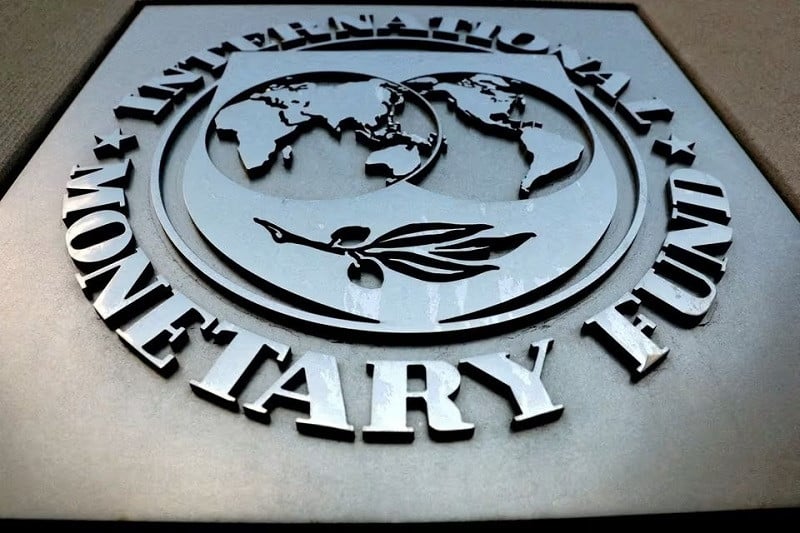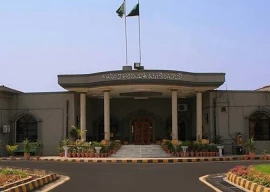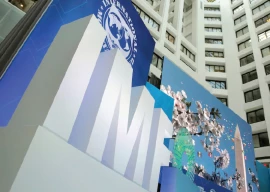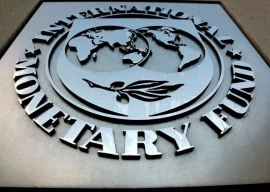
Pakistan has requested the International Monetary Fund (IMF) to review the possibility of extending another $1 billion to $1.5 billion programme to meet the financing requirements for long-term reforms for mitigating the impacts of climate change.
The issue of the new programmethe Resilience and Sustainability Facility (RSF)was raised by Pakistani authorities during a meeting between Prime Minister Shehbaz Sharif and IMF Managing Director Kristalina Georgieva. The meeting was held after the IMF board meeting on Wednesday and on the sidelines of the United National General Assembly session in New York.
"During the meeting, they discussed the urgent need of mobilizing adaptation financing for climate change," said a statement from the Prime Minister's Office on Thursday. The prime minister agreed to have the finance minister take up this critical issue with senior IMF management during the Annual Meetings in October, it further stated.
A day earlier, the IMF approved the $7 billion loan programme for a period of three years, which also helped fulfilling one of the eligibility criteria for qualifying for the IMF's highly concessional climate related lending.
Pakistan had requested climate financing a few months ago but the IMF said the country did not meet one of the conditions of having a larger programme. During the meeting, Minister for Finance Muhammad Aurangzeb highlighted that after the approval of the $7 billion programme, Pakistan has met the eligibility criteria.
Aurangzeb would now take up the issue of the new programme with the IMF during his next month visit to Washington to attend the World Bank-IMF annual meetings. The Pakistani authorities said the country can get access to $1 billion to $1.5 billion concessional financing.
Pakistan also meets the requirement of the Country Climate and Development assessment report, which the World Bank carried in 2022another eligibility criterion.
The Resilience and the Sustainability Facility is one of concessional loans, which is repaid over a period of 20 years, unlike the Extended Fund Facility that has to be paid back in four and half years to 10 years.
The Resilience and Sustainability Facility provides affordable long-term financing to countries undertaking reforms to reduce risks to prospective balance of payments stability, including those related to climate change and pandemic preparedness.
This facility provides long-term financing to strengthen economic resilience and sustainability by supporting policy reforms that reduce macro-critical risks associated with climate change and pandemic preparedness, and augmenting policy space and financial buffers to mitigate the risks arising from such longer-term structural challenges.
The eligible countries requesting access to the RSF need high-quality policy reforms addressing the long-term structural challenges of climate change or pandemic preparedness. They are also required to have in place better regulatory and institutional frameworks in an area where Pakistan appears weak.
During the meeting, the IMF managing director appreciated Pakistan's resolve to undertake the reforms, including the personal commitment that Prime Minister Shehbaz Sharif showed in completing the last facility.
However, she emphasized the need for achieving the tax targets, which is one of the weakest areas of the new EFF programme. The two leaders agreed to strengthen cooperation between the government and the IMF to promote economic stability and growth, said the PM's Office.
The PM's Office stated that Shehbaz Sharif appreciated the collaboration with the IMF for the approval of the $7 billion facility. The PM highlighted the government's commitment to implementing structural reforms and promoting private sector development. Shehbaz also thanked Finance Minister Aurangzeb for his active role in securing the IMF bailout package.
He also expressed appreciation for the IMF's technical assistance and capacity-building programmes, which have helped to strengthen the country's institutions and improve its economic management.
The IMF managing director expressed the Fund's support for Pakistan's efforts and emphasized the importance of maintaining macroeconomic stability and promoting inclusive and sustainable growth.
One of Pakistan's commitments to reduce the fiscal losses is to effectively implement the privatization agenda that has been agreed with the IMF. The first test is whether the government is able to hold bidding for the privatisation of the Pakistan International Airline on October 1.
Privatisation Commission Secretary Usman Bajwa said early this week that the PIA bidding would take place on October 1 and the bidders would submit the earnest money on Friday (today). Bajwa did not respond to a request for comments whether the bidding was still taking place on Tuesday or it was postponed.
The two sources in the government said that the PIA may not go under hammer on Tuesday and all the logistics arrangements for the sale of 60% shares were stopped on Thursday.
The IMF on Thursday issued a statement after the approval of the $7 billion programme. It emphasized the need for reducing the size of the government, which the IMF said was a hindrance to the investment.
"A difficult business environment, weak governance, and an outsized role of the state hinder investment, which remains very low compared to peers," said the IMF. It further added that the tax base remains too narrow to ensure tax fairness, fiscal sustainability and meet Pakistan's large social and development spending needs.
The IMF said that Pakistan's vulnerabilities and structural challenges remain formidable, in particular, spending on health and education has been insufficient to tackle persistent poverty, and inadequate infrastructure investment has limited economic potential and left Pakistan vulnerable to the impact of climate change.
Without concerted adjustment and reforms efforts, Pakistan faces risks of falling further behind its peers.
The IMF said its key priorities under the new $7 billion programme include rebuilding policymaking credibility and entrenching macroeconomic sustainability through consistent implementation of sound macro policies and a broadening of the tax base.
The Fund also underscored the need for advancing reforms to strengthen competition and raise productivity and competitiveness; reforming SOEs and improving public service provision and energy sector viability; and building climate resilience.



1727419152-0/BeFunky-collage-(18)1727419152-0-165x106.webp)







1727413552-0/Copy-of-Untitled-(42)1727413552-0-270x192.webp)










COMMENTS
Comments are moderated and generally will be posted if they are on-topic and not abusive.
For more information, please see our Comments FAQ